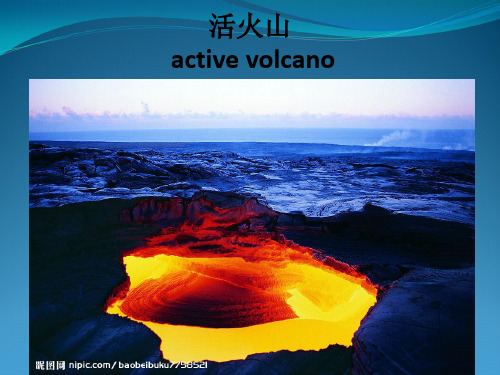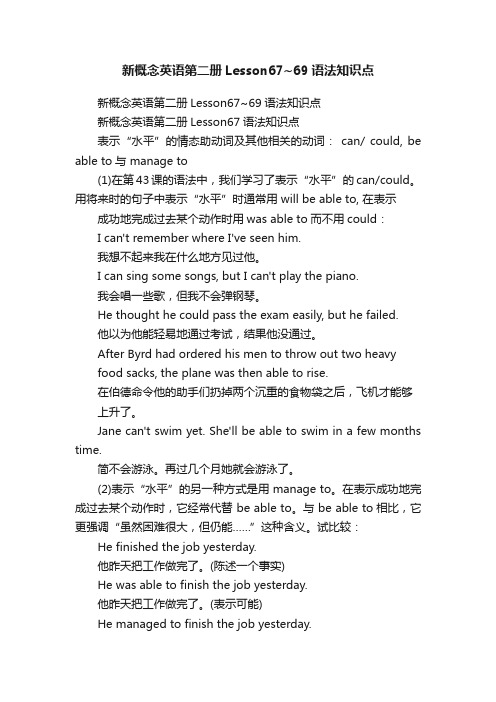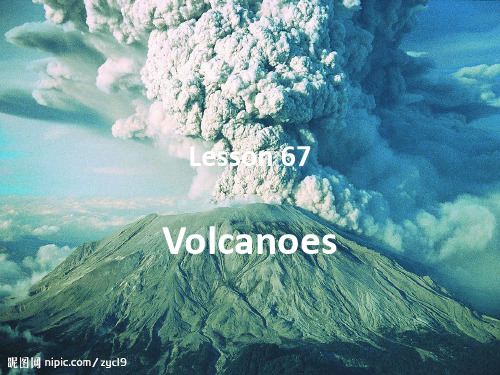新概念英语第二册课堂笔记:第67课
新概念英语第二册67课

brilliant adj.卓越的;非凡的;精彩的;有才华的;鲜
明的
a brilliant speaker 一位卓越的演说家 a brilliant achievements 非凡的成就 brilliant photos 精彩的照片 a brilliant artist 有才华的艺术家 a brilliant color 鲜艳的颜色
(龙卷风)
active • 1) adj. 活动的,活跃的 • an active member of the club • 2) adj. 积极的;主动的 • an active learner
take active steps active vioce take an active part in the activities 反义词 passive adj. 消极的, 被动的 an passive learner passive vioce actor; actress; action; actively
escape (run away) • ① vt. 逃脱 • escape death • escape doing sth. 逃脱做某事 • 他逃过了惩罚。 • He escape punishment/being punished. • ② n. 逃脱 • narrow escape 九死一生 They had three escapes from the prison this year. 越狱事件
如: The enemy officer was caught alive.
(作主语补足语,不用living)
那位敌方军官被活捉了。
We found the snake alive.
(作宾语补足语,不用living)
新概念英语第二册Lesson67~69语法知识点

新概念英语第二册Lesson67~69语法知识点新概念英语第二册Lesson67~69语法知识点新概念英语第二册Lesson67语法知识点表示“水平”的情态助动词及其他相关的动词:can/ could, be able to与 manage to(1)在第43课的语法中,我们学习了表示“水平”的 can/could。
用将来时的句子中表示“水平”时通常用 will be able to, 在表示成功地完成过去某个动作时用was able to而不用could:I can't remember where I've seen him.我想不起来我在什么地方见过他。
I can sing some songs, but I can't play the piano.我会唱一些歌,但我不会弹钢琴。
He thought he could pass the exam easily, but he failed.他以为他能轻易地通过考试,结果他没通过。
After Byrd had ordered his men to throw out two heavyfood sacks, the plane was then able to rise.在伯德命令他的助手们扔掉两个沉重的食物袋之后,飞机才能够上升了。
Jane can't swim yet. She'll be able to swim in a few months time.简不会游泳。
再过几个月她就会游泳了。
(2)表示“水平”的另一种方式是用 manage to。
在表示成功地完成过去某个动作时,它经常代替 be able to。
与 be able to相比,它更强调“虽然困难很大,但仍能……”这种含义。
试比较:He finished the job yesterday.他昨天把工作做完了。
(陈述一个事实)He was able to finish the job yesterday.他昨天把工作做完了。
新概念2 第67课

.
• Observe • 1)v. 观察,观测,注意看 • 注意看我怎样做 (这件事)
• Observe how I do this [how to do this].
• 2)v. 遵守<规则等>; 保持 • 遵守交通规则
• observe the traffic regulations
.
• Set up 竖立,架起;创立,建 立
• 他们竖起一些石头当界碑。
• They set up some stones as land marks.
• 在他17岁的时候就创立了一家公 司。
• He set up a company when he is only 17 years old..
.
• a river of… ……形成的河流 • a river of soil and stone • 泥石流 • 在二战中,血流成河。 • Rivers of blood flowed during World war II. • 当她听说了这个消息,眼泪如河水般从她脸上
• close to 离……很近,与……靠 近
• 他把车停到靠近河边的地方。 • He parked the car close to the
river. • 不要坐的离火太近。 • Don’t sit so close to the fire.
.
• Manage to do sth 设法做成某事
punished. • ② n. 逃脱 • narrow escape 九死一生 • 今年我们有三起越狱事件 • We had three escapes from the prison
新概念英语67课讲义资料讲解

新概念英语67课讲义Lesson 67 the weekend 周末一、单词与短语greengrocer: n.蔬菜水果零售商;absent:adj.缺席的,重要短语:be absent from:缺席、、、、He was absent from school last week.上周他没上学。
keep: v.(身体健康)处于(状况),保持、、、keep doing sth:一直做、、、或者是不停地做、、、、;keep knocking the door:一直敲门;spend:v.度过;spend a weekend:度周末;weekend:v.周末;country:n.国家;乡村;lucky: adj.幸运的;luck:n.幸运,机遇。
Monday:n,星期一;Tuesday:n.星期二;Wednesday:n.星期三;Thursday:n.星期四;Friday: n.星期五;Saturday: n.星期六;Sunday: n.星期日;在星期几前边一般加介词on,如:on Monday:在周一;On Sunday:在周日;二、短语、句型与语法1、Were you at the butcher′s?刚才您在肉店里吗?Yes, I was. 是的,我在。
在本句中,需要注意的一个知识点:在英文表示某一种商店的短语中,shop这个词往往可以省略,如文中的the butcher′s 其实就是the butcher′s shop的省略,另外像文中的the greengrocer′s 其实就是 the greengrocer′s shop 的省略,另外的例子还有the hairdresse r′s (shop )等等,shop 的省略不影响句义,就是一种表达的习惯。
2、how is jimmy today?吉米今天怎么样?在本句中我们继续复习关于询问人或事物状况的几个重要的句型:How is/are+主语、、、怎么样?例:How are you today?你今天可好?How is Tom today?汤姆今天可好?另外What is the matter with、、、?经常用来询问人和事物的状况,常作“是否有问题”“是否有麻烦讲”例如:What is the matter with Tom?汤姆怎么了啊?What is the matter with this bike?这辆自行车怎么了啊?What is the matter with the book?这本书怎么了?3、Was he absent from school last week?上周他没上学吧?在本句中需要掌握一个重点短语的用法:be absent from:缺席、、、例:He is absent from the meeting since he is ill.他今天缺席会议是因为他病了。
新概念英语第二册Lesson67课堂讲义

生词讲解1)Volcano 火山引申earthquake 地震seaquake海啸flood洪水2)Liquid液态的引申solid gas3)Escape 词组escape (from) doing sth 例句:He escape punishment/(from)being punished. 语法点讲解(语法全出自课文原句):1)take spend cost pay 表示花费时候的区别Spend:a)spend time/money (in)doing sth/ on sth spend主语是人,在。
上花费的钱/时间Eg: I spent two hours on this math problem.b)Spend money for sth 花钱买。
Eg:His money was spent for books.Cost:主语是物或某种活动,还可以表示“值”。
a)Sth costs sbEg: A new computer costs a lot of money.It cost me 2 hours to finishTake:后面常跟双宾语It takes sb+时间+to do sthEg: It took me 2 hours to finishPay:Pay (sb) money for sth /doing sthPay for sth /doing sth总结:用it作主语只能用take或者cost,用人作主语一般用spend或者pay做题选择题8(D)做选择题14(D)题目8让同学们改写成pay take cost的形式2)When 和while的区别a)引导时间状语从句When:at or during the time that 既指时间点也可以指一段时间While: during the time that 只能指一段时间所以while引导时间状语从句只能跟延续性动词Eg:I was reading a book while(when) he was knocking at the door.I was reading a book when while he got home.如果主句从句动词同时发生,且都是过去进行时,一般用while(上一行第一个例子)b)While表示转折(然而,却)He is smart while his brother is stupid.3)Close to = near to 靠近Close和closely 都可以作副词Close 接近(距离近)My friend and I live closeClosely 亲密(关系近)My friend and I are closely.做选择题7(C)4)Notice用法a)Notice that+宾语从句(课文原句He noticed that a river of liquid rock was comingtowards him)b)Notice sthEg: She noticed the beautiful butterfly.c)Notice sb do/doing sth 注意到某人做某事/正在做某事Eg: He noticed a river of liquid rock coming towards him做题选择题3(C)做选择题5(D)填空题6(Rivers of blood)选择题3中tear一般作为复数形式出现,water不可数tear可数,原因和trousers裤子pants短裤一样,裤子有两条裤腿所以复数,眼泪从两眼出来所以也是复数。
新概念英语第二册第67课 volcanoes

alive asleep alike ahead awake alone
单词学习
• • • • • • • • • • • • volcano active Kivu Congo Kituro erupt violently manage brilliant liquid escape alive
Lesson 67
Volcanoes
活火山
active volcano
休眠火山
dormant volcano
死火山(extinct volcano)
海底火山
Submarine volcano
基伍湖 Kivu
刚果 Congo
基图罗火山 Kituro
单词学习
• • • • • • • • • • • • volcano active Kivu Congo Kituro erupt violently manage brilliant liquid escape alive
manage v. 设法 manage to do sth. = succeed in doing sth.=be able to do sth. 设法做成某事 我总算下了车. I managed to get off the bus. 那栋房子你最后找到了没有? Did you manage to find the house? management n. 管理,经营 manager 经理 manageress 女经理
• alive(后定,表) • Every man alive has his/her own troubles.
alive adj. 活着的
• live adj. 现场的,活着的(不和人连用) • 现场演唱会 live concert • 活鱼 live fish • living 活着的(定,表) • living things /people • make a living
Volcanoes 火山-新概念英语第二册自学导读笔记第67课

Volcanoes 火山-新概念英语第二册自学导读笔记第67课新概念英语第二册第67课课文重难点 further notes on the text1.to set up his camp very close to the volcano,把帐篷搭在离它非常近的地方。
表示"与……靠近'可用 close to:he parked the car close to the river.他把车停在河边。
don't sit so close to the fire.别坐得离火那么近。
2.though he managed to take a number of brilliant photographs…即使他设法拍了一些精彩的照片……manage to do sth. 表示"设法做到某事"、"努力完成某事",即虽然很费劲,但仍然做到/完成某事。
另一短语 try to do sth. 可表示"设法做某事"、"努力做某事",但并不表示完成/做到的含义:he tried to open the door but couldn't.他试图打开那门,但打不开。
he managed to open the door.他设法把门打开了。
i finally managed to buy a house.我终于设法买了一座房子。
3.a river of liquid rock,一股岩浆。
river在这里为比喻用法,表示"(……的)巨流"。
因为 a river of 这个结构中没有 as, like等明确表示"像"的词,所以,它是一种暗喻。
when she heard the news, a river of tears came down her face.她听到这个消息后,泪如泉涌。
新概念英语第二册课后题答案详解:Lesson67

新概念英语第二册课后题答案详解:Lesson67新概念英语第二册课后习题Lesson 671. d根据课文第2-3行 In 1984, he went to lake Kivu in the Congo to observe a new volcano which 能够看出只有d. to investigate a new volcano (调查一座新火山)与课文的内容相符,其他3个选择都与课文的实际情况不符,所以选d.2. a根据课文第9-10行…but Tazieff managed to escape…Hewaited until the volcano became quiet and he was able toreturn two days later 能够判断,只有a. and Tazieff had to leave but he returned later 与课文的实际情况相符,其他3个选择都与课文的实际情况不符,所以选a.3. d前一句中的managed to 表示“成功地完成了的动作”,本句需要对这个动词作解释说明。
a. might have taken (本来应该做);b.could have taken (本来能够做);c. should have taken (本应该做);这3个选择含义相同都表示“过去该做,但却没做”,与managed to 含义不同。
只有 d. succeeded in taking 与 managed to 意思相同,所以选d.4. d前一句he escaped just in time 意思为“他刚好即时逃离了。
”句中的just 是表示强调语气的副词,它的含义是“正好”,“勉强地”,本句是对前一句的进一步解释。
a. just only 的意思不通;b. only (仅仅,仅仅)与前一句含义不符;c. soon (不久,很快)与前一句意思不符;只有d. only just (仅仅勉强地)与前一句含义相符,所以选d.5. d该句的动词waited(等待)是不及物动词,后面只能跟for引导的短语。
- 1、下载文档前请自行甄别文档内容的完整性,平台不提供额外的编辑、内容补充、找答案等附加服务。
- 2、"仅部分预览"的文档,不可在线预览部分如存在完整性等问题,可反馈申请退款(可完整预览的文档不适用该条件!)。
- 3、如文档侵犯您的权益,请联系客服反馈,我们会尽快为您处理(人工客服工作时间:9:00-18:30)。
新概念英语第二册课堂笔记:第67课lesson 67
volcano n 火山
active adj 活动的
Kivu n 基伍湖
Congo n 刚果
Kituro n 基图罗
erupt n (或山)喷发
violently adv 猛烈地,剧烈地
manage v 设法
brilliant adj 精彩的
liquid adj 液态的
escape v 逃脱
alive adj 活着的
active:积极的
passive:消极的,被动的
violent(adj)
manage to do
i can manage it
escape death:死里逃生
narrow escape:九死一生
escape doing sth
alive 做定语时一定要放在被修饰词后面
living sth
live(adj):现场的;表“活着的”永远不和人连用text
Haroun Tazieff the Polish scientist, has
spent his life-time studying active vol-canoes and deep caves in all parts of the world. In 1948, he went to lake Kivu in
the Congo to observe a new volcano
which he later named Kituro. Tazieff was
able to set up his camp very close to the volcano while it was erupting violently. Though he managed to take a number of
brilliant photographs, he could not stay
near the volcano for very long. He
noticed that a river of liquid rock was
coming towards him. It threatened to sur-
round him completely, but Tazieff man-
aged to escape just in time. He waited
until the volcano became quiet and he was
able to return two days later. This time, he managed to climb into the mouth of
Kituro so that he could take photographs and measure temperatures. Tazieff has
often risked his life in this way. He has been able to tell us more about active
volcanoes than any man alive.
spend some time doing sth
用不定式做目的状语
close to:离......很近
for long=for a long time
notice sth
notice sb do/doing
notice that
river of...:......形成的河流
threaten to:有迹象表明
take a risk of/at a risk of:冒险
risk sth=risk losing sth:冒着失去......的危险
risk doing:冒着做......的危险
在两相比较中,如果前者属于后者,那一定要在比较时用other,else排除前者。
